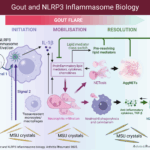Issues discussed at a meeting with the Office of Management & Budget included increasing Medicare reimbursement for physicians, telemedicine permanence, removing G2211 restrictions, adequate reimbursement for therapies and more flexibility for chemotherapy administration codes. The proposed rule is currently under review by the OMB, which is usually the last step prior to releasing publicly for stakeholder review and comment.
The ACR/CHEST ILD Guidelines in Practice, a video
In collaboration with the American College of Chest Physicians, the ACR released two new comprehensive guidelines aimed at improving the screening, monitoring, and treatment of patients with interstitial lung disease (ILD) secondary to systemic autoimmune rheumatic diseases (SARDs). Recently, Sindhu R. Johnson, MD, PhD, professor of medicine at the University of Toronto, Canada, director of the Toronto Scleroderma Program and principal investigator for the guideline, and Elana J. Bernstein, MD, MSc, Florence Irving associate professor of medicine in the Division of Rheumatology at Columbia University, New York City, and co-first author, presented a webinar to talk about how the guidelines were developed and present some of the recommendations and their rationale: Watch the recording now!
Arkansas Leads the Nation with Landmark Pharmacy Benefit Manager Reform
Signed into law in April, the legislation will ban direct and indirect PBM ownership of pharmacies, effective Jan. 1, 2026. It addresses longstanding concerns about conflicts of interest, market consolidation and patient access created by vertically integrated PBM pharmacy models.
The ACR Calls on CMS, OMB to Reduce Burdensome Healthcare Regulations
In response to agency requests for feedback on how to streamline regulations and reduce administrative burden on Medicare program stakeholders and small business owners, the ACR called for the removal of certain regulations related to prior authorization, pharmacy benefit managers and Medicare Part B and Part D access.

Incarcerated Individuals with Rheumatic Conditions
In addition to the impediments to consistent, high-quality care suffered by all incarcerated individuals, incarcerated patients with rheumatic disease face challenges specific to the treatment, management & monitoring of rheumatic conditions.

New Analysis Reveals More Potential Contributors to Takayasu Arteritis
Recent research led to development of a cumulative genetic risk score for Takayasu arteritis, identifying differing susceptibility between groups with different genetic ancestries.
ACR Responds to Aetna Specialty Pharmacy Requirements
Aetna recently notified practices about the launch of its Combined Benefit Management Drug List, which will result in romosozumab-aqqg (Evenity) and infliximab (Remicade) moving to pharmacy-only coverage on July 1. The ACR is working to oppose this change.

Gout Flares & the NLRP3 Inflammasome
Understanding the role of NLRP3 inflammasome activation in gout flares points to potential of NLRP3 inflammasome inhibitors as a new treatment option.

New Editor in Chief Has Expansive Vision for Arthritis & Rheumatology
Incoming Arthritis & Rheumatology Editor-in-Chief Dr. S. Louis Bridges Jr., MD, PhD, discusses his path to rheumatology and outlines his vision for the journal.

Ethical Concerns in Rheumatology Require Nuance
Patient autonomy in healthcare decisions and physician conflicts of interest are just two areas of ethical concerns that arise frequently in rheumatology. Dr. Kelly Weselman discusses ethical dilemmas and how to address them.

Advocates for Arthritis 2025: By the Numbers
On May 6, more than 100 members of the rheumatology community participated in 118 meetings with lawmakers from 26 states—urging members of Congress to sustain research funding, address cuts and stabilize Medicare reimbursement, enact pharmacy benefit manager (PBM) reforms and protect Medicaid funding. See photos and stories from the event.
- « Previous Page
- 1
- …
- 8
- 9
- 10
- 11
- 12
- …
- 251
- Next Page »
